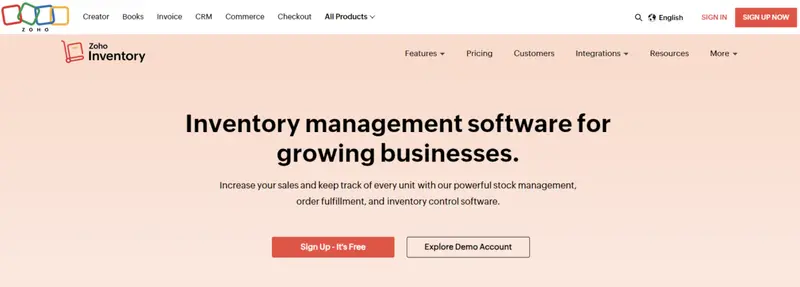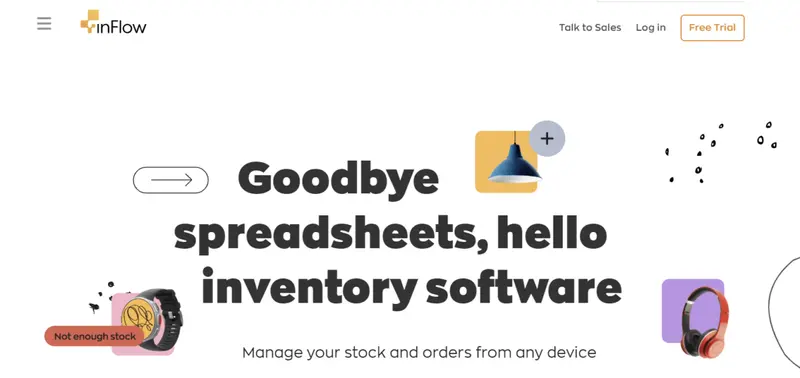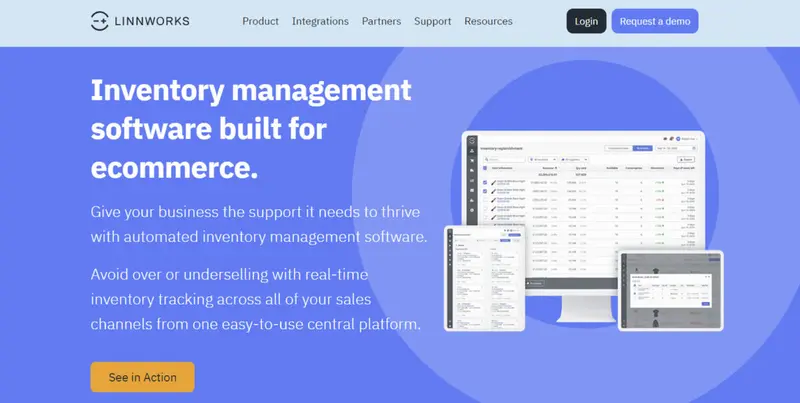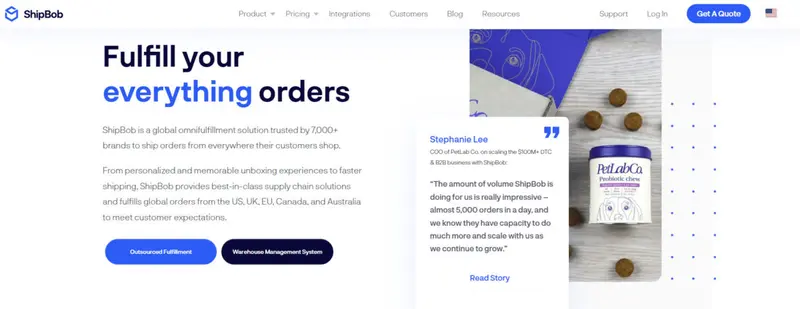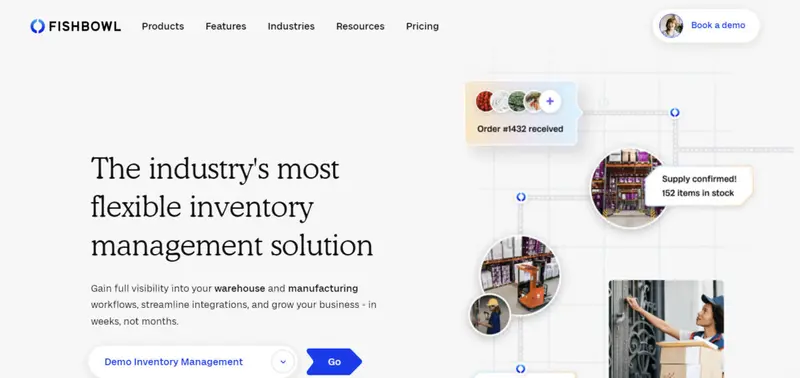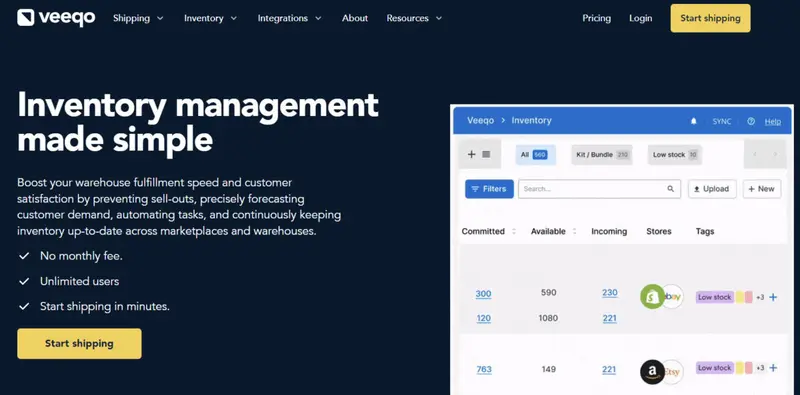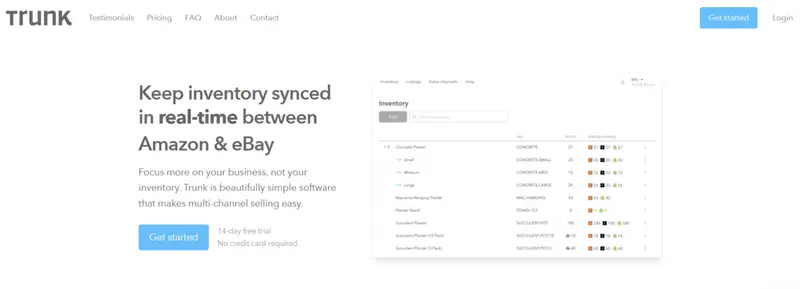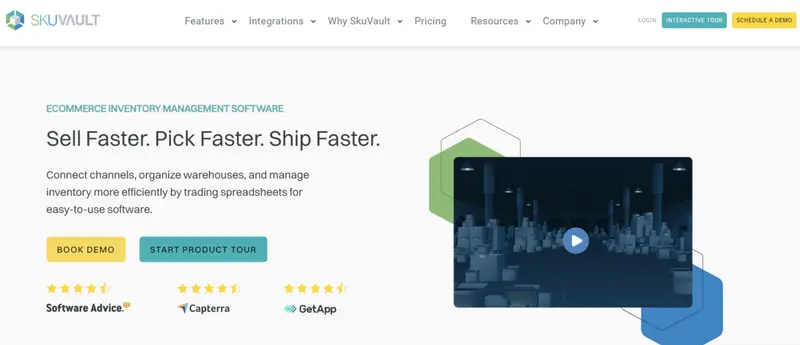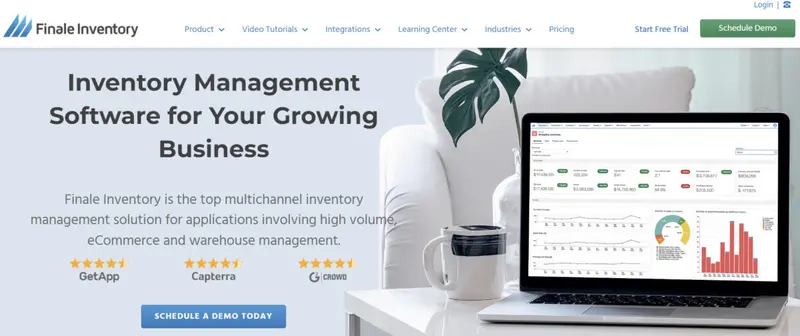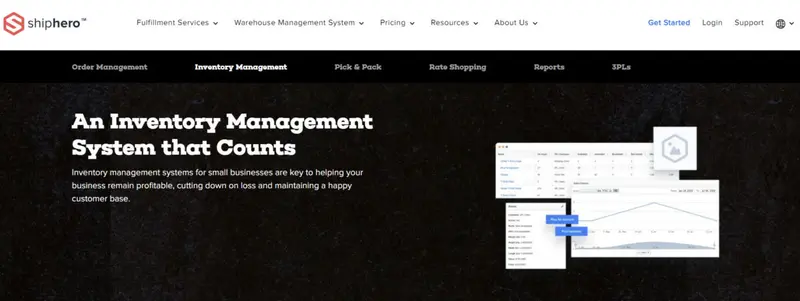As we have previously reported, the eCommerce market has seen tremendous growth in recent years. There was an increase of 8.1 percent in total retail sales in 2023 compared to the previous year, with eCommerce sales making up 14.6 percent of the total sales. eMarketer predicts that eCommerce will reach 23% of total retail sales by 2025. Even the market-leading brick-and-mortar retail chain, Walmart, has a sizable eCommerce presence now.
However, if you intend to operate a successful eCommerce store, you need to ensure that you can master all the necessary steps of inventory fulfillment (or use a service like Fulfillment by Amazon to do much of the necessary work for you). Developers have created many tools and platforms featuring specialist eCommerce inventory management software to help you fulfill your orders and keep track of your inventory items.
Common features of eCommerce inventory management software include stock purchasing management, inventory identification and tracking, real-time management of your inventory, handling online orders, and managing shipping. Most will create reports keeping you up to date with the state of your inventory activity and assist you to predict your future inventory needs.
Marketplaces: Amazon Vendor Central, Seller Central, Fulfilled by Amazon (FBA), Fulfilled by Merchant (FBM). Threecolts provides a streamlined solution for eCommerce inventory management, offering applications like DimeTyd and SellerBench that specialize in optimizing recoveries for businesses on Amazon’s platforms, thereby saving over $100M annually. Starting from a revenue-based fee of 30% of recoveries, it automates savings and provides clear insights into inventory-to-cash conversions for over 2,000 customers. Their SmartRepricer tool automates pricing for thousands of products, aiding in maximizing profitability. Regardless of the selling portal or geographical location, Threecolts tailors its solutions to meet the unique needs of every online retailer, making it a cost-effective choice for managing eCommerce inventory efficiently. Threecolts’ suite includes the FeedbackWhiz tool that automates review generation to enhance product listings on Amazon through improved review and feedback scores. Pricing for this tool begins at $20 per month post a 30-day free trial, making it accessible for various scales of operations. For those focusing on customer service, ChannelReply is a platform by Threecolts to manage e-commerce support tickets centrally, enhancing response times fourfold. This is besides the FW Profit Analytics tool which is designed to provide product-level income statements, shedding light on profit and loss metrics for Amazon FBA and FBM outlets. Their SmartRepricer tool is another feather in the cap, aiding in automatic pricing for thousands of products to maximize profitability and buy-box win rates. A 14-day free trial is available for this tool as well, post which pricing starts from $49 per month. Marketplaces: Amazon, eBay, Etsy, Shopify. Zoho offers a complete software suite to assist you with your sales, marketing, communications, human relations, and more. You can pick and choose the modules most useful to you, select a specialist suite of apps focusing on a particular area (such as CRM Plus, Finance Plus, Marketing Plus, and more), or use Zoho One, their all-on-one suite, to run your entire business. One of Zoho’s specialist products is Zoho Inventory, a multi-channel inventory management system. As a standalone platform, Zoho Inventory offers six plans. These range from a free plan that caters to small businesses with up to 50 orders, shipping labels, and Aftership tracking per month, to their Ultimate Plan catering to massive eCommerce stores achieving 25,000 each of orders, shipping labels, and Aftership tracking per month. You can use their order management system to manage your offline and online orders. Create purchase orders, backorders, and drop shipments, in a single inventory management application. You can track every item or batch in your inventory with their serial number and batch tracking feature. The app will provide you with real-time shipping rates and in-transit details of major shipping carriers so you can choose a shipping partner for your business wisely. You can also use Zoho Inventory to check stock levels, manage inter-warehouse transfers, and generate reports for specific warehouses. And if you use other Zoho products, for example, Zoho CRM or Zoho Books, Zoho Inventory seamlessly integrates, so you can automatically sync all your contacts and orders, and manage your sales, purchase, and inventory-related financial data. Marketplaces: Shopify, Amazon, WooCommerce. Inflow is specialist inventory software to assist you with all aspects of inventory management, both eCommerce inventory management and traditional inventory management for your brick-and-mortar stores. It gives you a real-time picture of what’s in stock and where each product is, even across multiple offices or warehouses. Inflow offers plans for all sizes of business, from the $110/mo. Entrepreneur plan limited to 100 sales orders/mo. to a $1319/mo. plan catering for Enterprises with enterprise-sized needs. If the set plans don’t meet your needs, you can contact Inflow’s sales team to put together a custom plan for you. Inflow includes so many features that we can’t mention most of them here. You can use it to organize your products, barcoding, printing and costing, stock tracking, reordering, and keep track of manufacturing inventories. Of course, inflow also interacts with your Purchasing, Sales, and Cash subsystems. You can even use it to create public and private B2B portals. Marketplaces: Amazon, Shopify, BigCommerce, eBay, WooCommerce. Linnworks describes itself as inventory management software built for eCommerce. Indeed, it makes the lofty boast of being a one-stop eCommerce solution. Its main areas of focus are multi-channel listing, inventory management, order management, shipping management, warehouse management, stock forecasting, and providing relevant insights. You can easily create, update, and optimize listings across all your key online sales channels. This makes it easy to manage large quantities of listings and revise existing product information in bulk by grouping similar listing templates, no matter which channels you use. You can even use it to update your pricing centrally, without having to go separately into the back ends of Amazon, eBay, Walmart, or your Shopify store. It features fully autonomous and fast inventory sync across multiple sales channels to ensure you always have the right product in front of the right customer. It provides all the information you need to ensure you know how much inventory you need to stock and when. Linnworks can tell you which products sell the best based on each sales channel. Marketplaces: Shopify, BigCommerce, Amazon, Walmart. As its name suggests, ShipBob is a global omnifulfillment solution to ship orders from everywhere that your customers shop. You can use ShipBob to ship orders to more than 220 countries and territories. You can either outsource your fulfillment using ShipBob’s tech-enabled 3PL or use ShipBob’s warehouse management system (WMS) to fulfill your products internally. ShipBob features turnkey integrations with all major eCommerce platforms and marketplaces. You can import orders and send data back and forth for a two-way flow of information. It even includes B2B and EDI integrations for retail dropshipping and wholesale distribution. ShipBob WMS is an all-in-one platform to improve how you manage fulfillment. It includes warehouse management, inventory management, order management, transportation management, pick and pack, and much more. You can use it across multiple warehouses with unlimited users, making remote access easy regardless of where they are located. It also provides top-level order fulfillment metrics across all warehouses, order counts at the picked, packed, and labeled statuses, and quickly identifies orders that need fulfillment prioritized. Marketplaces: Shopify, Amazon, Zoho. Fishbowl offers a mix of on-premise and cloud-based inventory management solutions. They cater to all types of businesses holding inventory, whether they be eCommerce-based, traditional brick-and-mortar, or a hybrid of the two. You can also use Fishbowl if you’re a manufacturer, having to keep track of raw materials, work in progress, and finished goods. Fishbowl Drive is their (first) cloud-based platform. It features efficient scanning and barcoding, accurate order management and inventory control, workflow, process traceability, and much more. The company is also currently signposting an upcoming product, Fishbowl Go, which they describe as offering their core, cloud-based inventory management software at their most affordable rate. The company’s on-premise software is Fishbowl Advanced. You can use it for all facets of inventory control, including purchasing, inventory management, manufacturing, and sales. You can manage purchase orders, vendor or client purchasing data, and stock receipts. Determine your true cost of goods sold with detailed landed cost calculations that consider shipping, duties, and fees. Fishbowl helps you accurately track your inventory from bins to warehouses, customize your part and product labels to meet your specific inventory management needs, and automate repetitive processes. You can integrate payments from point-of-sale and eCommerce platforms into your accounting records. Fishbowl integrates with dozens of software platforms, including UPS Ready, QuickBooks, Xero, Salesforce, Zoho, and many more. Marketplaces: Amazon, eBay, Shopify, Walmart. You can use Veeqo to prevent sell-outs, precisely forecast customer demand, automate tasks, and continuously keep inventory up to date across marketplaces and warehouses. And, unlike the other inventory management platforms we’ve covered here, you can use Veeqo for free – unlimited users, no monthly cost, unlimited orders, and no shipping label limits. How is this possible? Veeqo says they operate this model because they financially benefit from shipping volume passed to their partner shipping carriers. You can store inventory in multiple locations and use Veeqo to track changes in available stock levels made from sales, purchase orders, location transfers, inventory counts, and more. It features customizable warehouse workflows, trusted carriers, and connections to multiple selling channels and marketplaces. You can easily update stock and prices for products on every marketplace and store you connect to Veeqo from one place, saving you hours of manual admin time. Veeqo even makes it easy to create bundles within their platform for upsells, cross-sells, and marketing promotions across all your stores. Marketplaces: Amazon, Amazon Handmade, eBay, Etsy, Faire, Shopify, Square, Tundra, WooCommerce. Trunk is a cloud inventory management platform designed for businesses that seek to efficiently synchronize and manage their stock levels across multiple sales channels in real-time. They are currently beta testing integrations with several other popular channels too. It keeps your stock levels synced no matter how or where a change happens. It provides an example of someone who manually adjusts stock levels on Etsy, receives an order on Shopify, and refunds an order on eBay. Trunk can keep it all synced. Trunk builds its own inventory and stock levels from your sales channels’ listings. So, the first sales channel you’ll want to connect to is the one with the most accurate stock levels. Once Trunk has built its own inventory, it’ll then sync these stock levels to any new sales channels you connect later. Trunk currently offers two plans, each priced according to the number of orders per month you receive. The Essential Plan includes all core features including real-time stock level syncing and low stock alerts. The Pro Plan adds bundling & kitting, and duplicate SKU syncing. Marketplaces: Amazon, eBay, Etsy, Shopify, Walmart, BigCommerce, WooCommerce. SkuVault describes itself as providing streamlined inventory and warehouse management. They base their pricing on the orders you receive each month. Core pricing includes creating and maintaining a catalog of your products, managing the purchase of inventory, quality control, reporting, stock forecasting, and warehouse management, along with API access, shipping integrations, and a range of core integrations. You can buy enhanced warehouse add-ons, including enhanced warehouse management, advanced end-to-end 3PL inventory tracking, assignment, tagging and reporting, wave picking, lots, kitting & bundling, warehouse workflows, serialization, and additional integrations. SkuVault provides easy-to-understand, yet actionable, reports in real-time. For example, they can create a replenishment report for sellers who want to prevent out-of-stock, ensuring positive seller ratings by always having best-selling merchandise on hand. SkuVault Warehouse Management System uses barcode scanning to optimize your warehouse operations for accuracy and speed. You can scan in products when receiving them to adjust inventory levels as they occur. The platform syncs with your eCommerce CMS software every five minutes. With quantity syncs, products listed across your marketplaces are updated in real-time. Your Amazon FBA inventory is also visible and updated in SkuVault so you can see all your inventory in one dashboard. Marketplaces: Amazon, eBay, Shopify. Finale Inventory is a multichannel inventory management solution for applications involving high volume, eCommerce and warehouse management. Its inventory management system features centralized inventory, multichannel integrations, wireless barcode scanning, warehouse management, and order management, alongside inventory accounting and landed costs. The platform gives you an up-to-date count for all your products in one place and helps you easily control your inventory in multiple warehouses. It offers over 40 integrations, so you can keep all of your marketplace listings in sync and up to date by continuously updating the stock levels automatically. You can use advanced batch picking methods, such as wave picking and pick and pack, to improve order picking efficiency and reduce costly picking errors. You can manage every shipment that goes in or out of your warehouse using Finale. The software streamlines ordering, packing, and shipping, so you can have a seamless transition from one step to the next. Finale ensures flexibility with features such as sending an order in multiple shipments or generating lot IDs. Marketplaces: Shopify, Amazon. Shiphero provides an end-to-end warehouse management system. They claim that their system simplifies eCommerce picking, packing, and shipping, which allows your team to pick and pack more in the same amount of time, and train recruits faster. It includes one-click integrations with systems like Shopify, Amazon, and Returnly to make it easier to manage orders and returns. Shiphero keeps constant communication with your sales channel ensuring your inventory numbers will never be off again. It caters to multi-warehouse and order allocation, POs and receiving, re-order and replenishment level setting, cycle counting, kitting, logs & reports, and Putaway. It features mobile pick and pack, using mobile tech that makes picking faster and more efficient. Orders seamlessly flow to your pickers, packers, and shippers for accurate and efficient processing. Mobile picking, real-time carrier rate shopping, and Bulkship make the fulfillment process in your warehouse faster, easier, and more accurate. ShipHero’s real-time ship rate shopping ensures you’ll always find the cheapest carrier label which will save you money. The platform provides you with real-time monitoring to help you make intelligent decisions. Use the Hero Board, for real-time in-warehouse insights to improve your order processing. Detailed reporting gives you insights into employee productivity, sales, and accuracy.1. Threecolts
2. Zoho Inventory
3. inflow
4. Linnworks
5. ShipBob
6. Fishbowl
7. Veeqo
8. Trunk
9. SkuVault
10. Finale Inventory
11. Shiphero
Final Thoughts
The underpinning of a thriving ecommerce operation lies in a seamless inventory management system. With the right software in your corner, receive intelligent stock notifications on your handheld device, safeguard your inventory data, and ensure its real-time accuracy. It's my hope that you've identified a fitting option from my compilation or garnered enough insights to guide you to the ideal solution for your enterprise.
Frequently Asked Questions
What is eCommerce inventory management software?
eCommerce inventory management software is a digital tool designed to help online retailers efficiently track and manage their inventory levels, sales, and orders across various sales channels.
What are the key features of eCommerce inventory management software?
Common features include real-time inventory tracking, automated order management, barcode scanning, multi-channel integration, reporting and analytics, and automated stock updates.
How does eCommerce inventory management software benefit my business?
This software helps optimize stock levels, reduce the risk of stockouts and overstocking, streamline order fulfillment, and improve overall operational efficiency, ultimately leading to increased sales and customer satisfaction.
Can eCommerce inventory management software integrate with other business systems?
Yes, many eCommerce inventory management solutions can integrate with various systems, including accounting software, customer relationship management (CRM) tools, and eCommerce platforms, providing a holistic view of your operations.
How do I choose the right eCommerce inventory management software for my business?
Consider factors such as your specific inventory challenges, the software's features, ease of use, integration capabilities, scalability, and customer support when evaluating different options.
Is eCommerce inventory management software suitable for small businesses?
Yes, eCommerce inventory management software can benefit businesses of all sizes, including small and medium-sized enterprises, by providing tools to manage inventory efficiently and scale operations.
How does the software help prevent overselling and stockouts?
By providing real-time inventory tracking and automated stock updates, the software ensures that stock levels are accurately reflected across all sales channels, helping to prevent overselling and stockouts.



